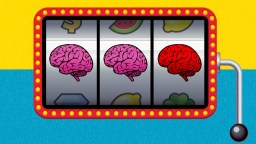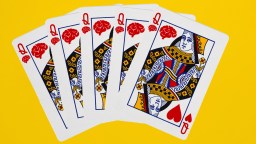Success isn’t about finding one great way to achieve something and sticking with it. It’s about looking at all the possible options and computing success through analysis. It works brilliantly in poker, and it works well in life, too.
Audience Question: You had a very interesting point that a successful strategy is not really about optimization, but it’s about computation and deviating from optimization.
And to me as a chess player, the reason I’ve always liked chess is precisely because there are no elements of chance.
You, on the other hand, are always in some ways a potential victim out of chance, so how do you kind of weld those two things together, how do you deal with the vagaries of chance to make sure that you can always manipulate it favorably?
Maria Konnikova: Well, you can’t ALWAYS manipulate chance favorably, that’s I think the bottom line. But what you can do is actually try to just maximize what you can control.
So what I always do, what Erik has always taught me to do, is make sure you’re making the right decisions for the right reasons.
And so I might play a hand in a very strange way because I am exploiting someone who I think is being— because I’m female one of the things that often happens is people become much more aggressive against me, because they think they can get me to fold a lot of hands and so they’ll 3-bet me, which means raising my opens much more often with a lot of weaker hands, or when I’m in one of the blinds so I have to be in the hand they’ll raise me much more widely, so they’ll do things like that.
And then sometimes I’ll have a horrible hand and one that I would never in a million years 4-bet, but I’m going to 4-bet, I’m going to actually re-raise them with garbage because I know what’s going on, and sometimes I’ll run into a really strong hand, but more often than not I won’t.
So that’s what I meant by exploitation, I’m still not going to be able to get away from the chance elements that happen in any hand, so what Erik is always very careful to tell me is never—he doesn’t care actually what happens at the end of the hand, he doesn’t want to know if I won or lost.
Like once the decision is done, it doesn’t matter, and so the outcome—you have to divorce yourself from the outcome.
You have to say, “Am I making the right decision? Am I thinking about it the right way at every single step of the hand? Can I defend why I’m doing something, even if I’m doing something really weird that I wouldn’t normally do in a spot like this? Do I have a reason for it?”
And if the answer is yes, and if the reason is a good one, then I play the hand to the best of my abilities.
And it actually sometimes helps when I’m in a tough spot to know that I’m going to be explaining this to someone, that I’ll be explaining it to Erik or that I’ll be explaining it to Phil or to someone, then I know that I actually have to think through my reasons rather than just act reflexively, which can be very easy to do.
Sometimes you’re like, “Oh I always do this here, I’m just going to do it quickly.”
But to actually stop and question it and then happen what may—It can still be really tough when you make the “right” decision and then you end up losing; it’s not pleasant, but you have to try not to think about that and to remember that you just made the best choice you possibly could given the information that you had available.
And it’s easy to criticize other players when you see them do something really weird, you’re like “How could you have done that there?!” But you have to remember that you see all of the information, you know what hands other people have because you’re watching this on TV.
They don’t see any of that and they’re actually just acting based on the information that they do have.
But all of that said, it still really sucks to lose.





